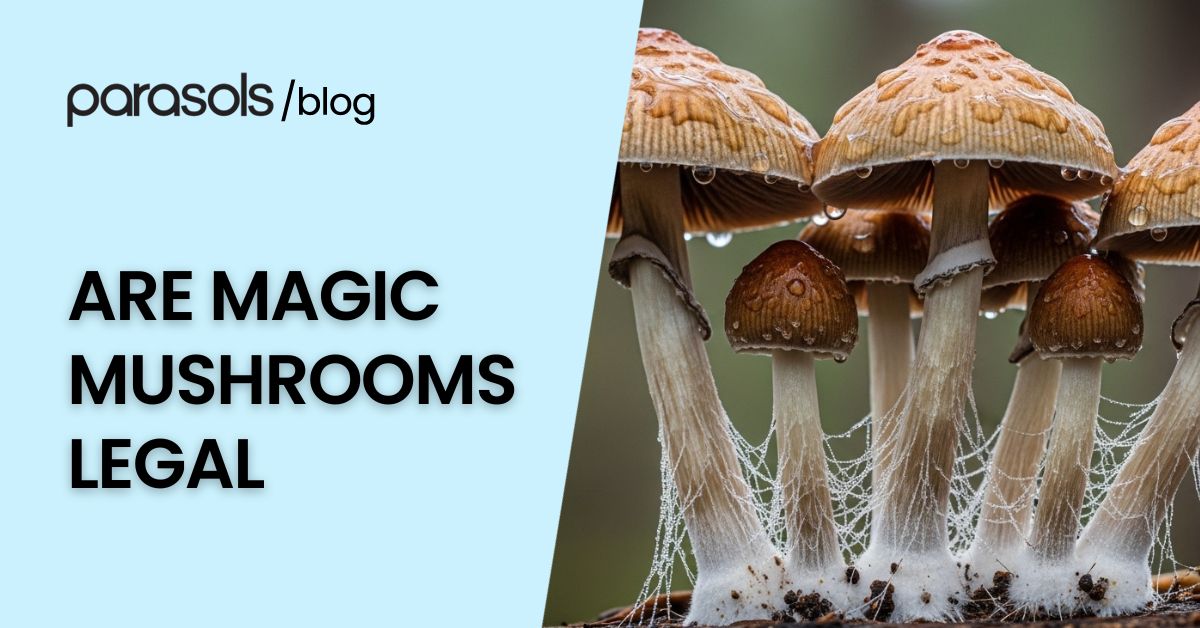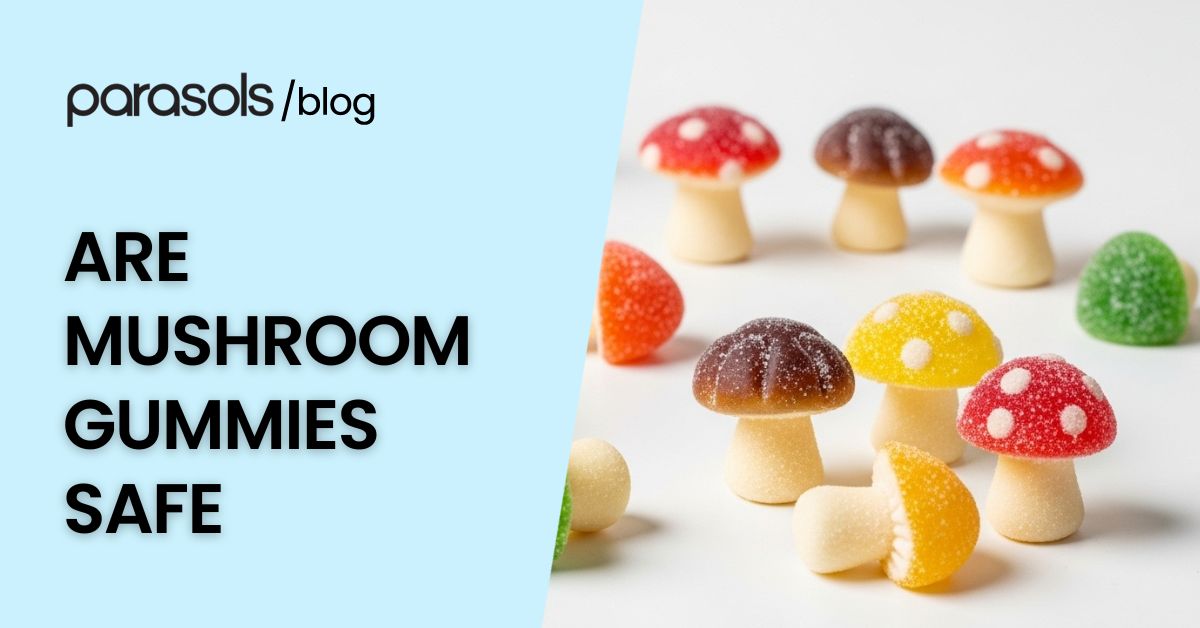Magic mushrooms, known for their psychedelic effects due to the compound psilocybin, have sparked growing interest in both scientific research and mental health treatment. Have you ever asked yourself are magic mushrooms legal? Their legal status remains complex and varies significantly across jurisdictions. Here's a concise overview of the key points you need to understand.
Are Magic Mushrooms Legal?
Magic mushrooms are generally considered illegal at the federal level in many countries, including the United States, where psilocybin is classified as a Schedule I controlled substance under the Controlled Substances Act. This means it is viewed as having no accepted medical use and a high potential for abuse.
However, laws are evolving—some U.S. states and cities have decriminalized personal possession or made enforcement a low priority, and countries like Canada and certain provinces of the Netherlands allow limited medicinal use or psychedelic tourism under specific conditions. Parasols offer high quality mushroom gummies like our pineapple non detect shroom gummies.
Factors Affecting the Legality of Shrooms
The legal status of magic mushrooms depends on a range of factors that vary by location, purpose of use, and how the substance is classified under the law. Below are the key elements influencing their legality:
1. Federal vs. State or Local Laws
At the federal level, psilocybin is a controlled substance in many countries, making possession or use of magic mushrooms illegal. However, some state or local governments—such as Oregon and certain U.S. cities—have passed laws or ballot initiatives to decriminalize or regulate their use for medicinal purposes.
2. Medical and Therapeutic Use
Growing interest in the therapeutic benefit of psilocybin for mental health conditions, such as treatment-resistant depression, has prompted scientific research and limited legal exemptions for medicinal use. In some areas, licensed professionals can administer psilocybin in clinical settings.
3. Type of Substance or Material
Psilocybin mushrooms themselves are typically illegal, but the legal status of psilocybin spores or related substances like ibotenic acid may differ. For example, mushroom spores may be openly sold in certain states or countries where they contain no active psilocybin until cultivated.
4. Amount and Intent of Possession
The legality can also hinge on how much of the substance a person has and whether it's for personal use, growing psilocybin mushrooms, or distribution. Some areas have decriminalized possession of small amounts for personal use, even if full legalization hasn't occurred.
5. Purpose of Use
Personal, spiritual, or entheogenic use is sometimes protected under local laws or by religious freedom arguments. However, these defenses are often limited and do not apply at the federal level or in many countries where such use is still considered illicit.
Which States Allow the Use of Magic Mushrooms?

While psilocybin remains illegal under U.S. federal law, a growing number of states and cities have taken steps to decriminalize or allow limited use, especially for medicinal or therapeutic purposes. Here's a quick look at where magic mushrooms have gained legal or semi-legal status:
- Oregon – First U.S. state to legalize the supervised therapeutic use of psilocybin through licensed facilities under a state-regulated program.
- Colorado – Legalized the use and possession of certain psychedelics, including psilocybin, for adults 21+ through a statewide ballot measure.
- California (select cities) – Cities like Oakland and Santa Cruz have decriminalized the personal use and possession of entheogenic plants, including magic mushrooms.
- Washington (Seattle) – Declared the investigation and arrest for personal use of psilocybin and other entheogens as the lowest law enforcement priority.
- Massachusetts (select cities) – Cambridge and Somerville have passed local resolutions deprioritizing enforcement of psilocybin-related offenses.
- Michigan (Ann Arbor, Detroit) – These cities have decriminalized personal possession and use of entheogenic plants and fungi.
Which States Ban the Use of Magic Mushrooms?
Despite growing interest in psilocybin for therapeutic use, many U.S. states continue to strictly prohibit magic mushrooms. In these areas, possession, sale, or cultivation is considered illegal and can lead to criminal charges. Below are some examples:
- Idaho – Has some of the strictest psilocybin laws; both possession and the use of psilocybin mushroom spores are explicitly illegal.
- South Dakota – Classifies psilocybin as a Schedule I controlled drug with no accepted medical use and harsh penalties for possession.
- Kansas – Psilocybin is considered a Schedule I substance, and even mushroom spores are banned under state law.
- Georgia – Strongly enforces laws against possession or distribution of any controlled psychedelic substances, including magic mushrooms.
- Texas – Considers psilocybin an illegal substance with penalties for possession, though some research exemptions exist under tight control.
- Tennessee – Bans both psilocybin and psilocybin spores, with laws targeting both usage and distribution.
How to Buy Magic Mushrooms Legally
Buying magic mushrooms legally depends on where you live and the specific legal frameworks in place. Below are some practical tips for legally obtaining psilocybin in permitted areas:
Check State or Local Laws
Before attempting to buy, research whether your city, state, or province allows possession, personal use, or therapeutic access to psilocybin. Some places have only decriminalized small amounts, not authorized sales.
Use Licensed Facilities
In areas like Oregon, you can access psilocybin legally through licensed professionals at approved facilities. These are typically used for supervised sessions tied to mental health treatment.
Look for Medical or Therapeutic Programs
Some jurisdictions permit access under medical exemptions or clinical trials. Programs may require a diagnosis such as treatment-resistant depression and supervision by licensed providers.
Avoid Black Market Sources
Purchasing from unregulated sellers is illegal and risky. Even in decriminalized areas, unauthorized sales are often still prosecuted under controlled substance laws.
Consider Psilocybin Mushroom Spores
In some states, spores that don’t contain psilocybin can be legally purchased for research or educational purposes—though growing them into mushrooms may still be illegal depending on local laws.
Final Thoughts

The legal landscape surrounding magic mushrooms is rapidly evolving, shaped by scientific research, public health concerns, and shifting attitudes toward psychedelic substances. While psilocybin remains a controlled substance in many areas, some jurisdictions are beginning to recognize its therapeutic potential and adjust their laws accordingly. Understanding your local regulations is essential before considering any form of use, possession, or purchase.
Before considering any form of use, possession, or purchase, it is essential to review the most current local regulations and seek professional legal or medical guidance when necessary. Staying informed is the safest way to manage this changing landscape responsibly.
Frequently Asked Questions
Can you travel with magic mushrooms between states or countries?
No, transporting magic mushrooms across state or national borders is illegal, even if both locations have decriminalized or legalized their use.
Are there age restrictions for using psilocybin legally?
Yes, in jurisdictions where psilocybin use is permitted, access is typically restricted to adults 18 or 21 years and older, depending on local laws.
Can psilocybin show up on a drug test?
Yes, certain drug tests can detect psilocybin or its metabolites, especially in specialized screenings for psychedelic substances.
Are synthetic psilocybin products treated differently under the law?
No, synthetic psilocybin is generally classified the same as natural psilocybin and remains a controlled substance unless part of a regulated medical program.
Is it legal to microdose psilocybin?
Microdosing is still considered illegal in most places where psilocybin is banned, regardless of the dose size, unless permitted under a specific exemption or program.
Can you grow magic mushrooms at home for personal use?
In most regions, growing psilocybin mushrooms is illegal, even for personal use. Some local laws may decriminalize this activity, but it remains a punishable offense under federal law.
Do magic mushroom retreats operate legally?
Some psychedelic retreats operate legally in countries or regions that permit psilocybin use, like parts of Jamaica or the Netherlands. Always verify the retreat's licensing and legal compliance before attending.


Leave a comment
This site is protected by hCaptcha and the hCaptcha Privacy Policy and Terms of Service apply.